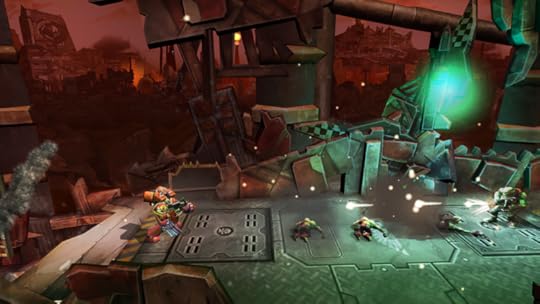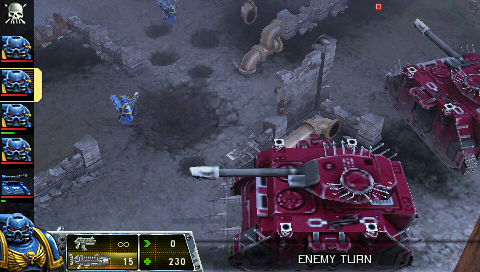Graham McNeill's Blog, page 2
November 14, 2014
Eternal Crusade – Death and the Maiden World
One of the things that’s been most helpful in crafting the stories to go alongside breathing life into Arkhona’s background has been a massive timeline that Ivan Mulkeen’s created to set out the history from pre-Crusade days to the age of the Imperium. There’s a huge amount of information on that and the sellotaped together strips of paper are always to hand in the folder I carry with me at all times when I’m out working.
I’d looked at this when I first got it and marked up scores of places that naturally suggested story hooks and I’ve been slowly working my way through them, jumping from ancient days to modern days, from faction to faction in order to keep a variety of stories feeding into the mix.
With a contemporary Space Marines story already released, I went back to the earliest days of the Kharon system (where Eternal Crusade is set…) and wrote an eldar story set shortly after the Fall, where the eldar have been left psychically reeling by the demise of their empire and the virtual extinction of their species. We get to see two characters who will play no part in the game itself (or will they…) but what they see and say, and what they set in motion form the cornerstone of much of the eldar way of life in the future. For example, there’s no Eldar Path yet, no Spirit Stones and only a vague appreciation of the danger their souls are in from She Who Thirsts. I like to balance the stories I’m doing, not only in who appears in them and what they’re about, but also in the nature of the stories. Where the opening Space Marine story was an all-out action-fest, this one was much more measured, more-dialogue heavy and weighty in terms of what the themes it encompassed.
Not only that, it’s now part of the art competition, where fans of Eternal Crusade are being asked to produced a piece of artwork based on a scene within the story. And as soon as there’s a result, I’ll be sure to put up an entry here.
The post Eternal Crusade – Death and the Maiden World appeared first on Graham McNeill.
Eternal Crusade Fiction Competition
A little while back, Behaviour ran a writing competition for the fans of Eternal Crusade to get involved and pen their own piece of fiction. They asked me to judge the entries, and with a few caveats on length and winnowing process, I was more than happy to do that. The winners have since been announced on the Eternal Crusade website, together with my commentaries on the top three stories. I’d written a short bit for all the twenty stories I eventually read, and here’s what I had to say about it all…
I normally don’t read unpublished writing that people send me.
Mostly because I’m simply too busy with my own work, but usually it’s because the person writing it is just starting out, and I don’t have time to give it the red-pen attention it likely requires. That’s not to sound dismissive in the slightest. We all start somewhere, we all put our first fumblings on the page in the hopes of writing something interesting. And if, in years to come, we look back at those first works, it’s often with a cringing sense of what was I thinking?
Trust me, personal experience has taught me the truth of this. I keep the first piece of writing I ever did for Games Workshop and it has more red ink on the printout than black.
And that’s necessary.
We need to see and feel we’ve improved, that we’ve learned things along the way. We need to get those words on the page before we can start refining them and learning from what we’ve done well, what we’ve done badly or what we just plain forgot to do. Only by getting words down on the page is it possible to grow as a writer.
Everyone who entered this competition has done that. And even if you didn’t make it to the final twenty, you’ve done more than a great many people who say they want to write will ever do.
You wrote. And that’s an incredible achievement in itself.
Almost four hundred of you wrote. We’ve been overwhelmed by the passion, enthusiasm and knowledge you’ve displayed. To get that many entries is amazing, and has made cutting them down a mammoth task. But like a World Eater hewing foes with his chain axe, cut down they were.
Twenty survivors landed in my Inbox with a simple remit.
Pick the best three.
In my experience, judging competitions like this are usually pretty easy. Sorting the narrative wheat won’t take long, right? A good story will always stand out, always be easy to spot. Right? And after reading the first couple of stories, I thought that I’d stumbled on two of the winners straight away.
This is going to be easy.
Not so much.
The more I read, the more I saw that every story was in with a chance. The more I read, the more I realised I was going to have to do more than just read them and pick whichever ones my gut told me were winners. It was too close to call without some form of comparison, so I assigned each story a value between one and ten in four categories:
1 – Originality: Had I seen this story a hundred times already or was it the same as a dozen others? Did it do something interesting with the setting and characters? Did it surprise me?
2 – Technical: Was the story grammatically sound, free from too many typos and did it flow well?
3 – Lore: Was the story faithful to 40k? Did it make basic mistakes or nail the lore perfectly? Did it make use of some quirk of background that showed a deep understanding of the setting?
4 – Wow Factor: Did the story do something that really made me sit up and take notice? Was there an element that made me think the author had crafted something above and beyond?
Add up all the scores and I would have my winners. It all sounds a bit mechanical, but when the stories were this good, I didn’t have much choice. Every story scored highly, but in the end there was one clear winner. Second and third place were tied, and it came down to that gut feeling I spoke about earlier to choose between them.
So, well done to everyone who entered, hats off to you all. And well done especially those of you who made it to the final twenty. I greatly enjoyed reading these stories, so thanks for letting me see what you all created. An honour and a privilege.
WINNER: The Shouting Contest by Irene K. Posey
I loved this story. It reminded me of Terry Pratchett, with great characters that were absolutely true to the lore and which made me laugh out loud several times. Tightly written, flowing, and with great respect for the lore of 40k and Eternal Crusade, I felt this captured what the orks are incredibly well. Not only that, but the haphazard nature of greenskin travel, their devil-may-care attitude and utter indifference to who they’re fighting, so long as they’re fighting. A worthy winner and I hope we see more of Irene’s work.
Second Place: The Path to Arkhona by Ben Hyde
An early standout, I loved the characters, the scene setting and the interplay between the Iron Warrior and the savant. The creepy atmosphere around the possessed tank was evoked wonderfully and the deeper questions posed by the Legionary established a great sense of place and time. I want to know more of these characters, and for that alone, Ben deserves this win.
Third Place: Arkhona, A Leap of Faith by Finn Kelly
I loved this story’s evocative use of the first person. Frythe was a great character, and his psychic powers were realised incredibly well on the page, as was his relationship with the other characters in the story. The action scenes were great, and an ending that left me wanting, needing, to know more was a great clincher. Finn’s done a great job with this story, and more than earns this place.
And in the other finalists…
Acridian312 – A nice whodunnit in space. I liked the twist at the end and the notion of a code hidden in gene-seed is a lovely (and particularly Hydran) way of doing things.
Andrew Hancock – A thumpingly good battle scene that showcased the Blood Angels at their best. Evocatively pulling the reader through, this did a nice job of showing just how dangerous a drop pod assault truly is.
Adrian Southin – I liked the sense of speed this story conveyed, and the sense of ferocity I felt from the Wild Riders. Adrian nailed the alien nature of the eldar as well as the horror of the tyranids.
Chowe – Like Irene’s story that eventually won, I loved the anarchic sense of the orks in this story. Again, it captured the resilience and love of war rooted in the ork psyche and ended on just the right note.
Chris J. Young – Space Wolves are often thought of as being easy to write. They’re just space Vikings, right? Sort of, but there’s much more to them than that. Chris gets that spot on in this tale, nicely capturing a sense of ferocity held in check by an equally ferocious intelligence. Keeping a note of ambiguity near the end is nice and establishing a credible backstory in so few words is a great achievement.
Connormf121 – I liked that the structure of this story was told out of sync, that we got to the ending first and worked back to that (like Memento or Irreversible), getting to see what brought the characters to that bloody end. This story nicely captured the secretive nature of the Dark Angels and the lengths they’ll go to in order to keep those secrets.
Goat64804 – I liked that we had a dreadnought as a main character, which – together with his recall of the Heresy – made for a different kind of story, one told mostly in flashback. That gave the current war on Arkhona a nice resonance, a sense that it’s war is eternal and that there’s a real, living history to the world.
Taylor Kaercher – I liked the viciousness of this story, the real sense that the traitors were incredibly dangerous and, at the end, incredibly callous. The battle scenes were evocative and the descriptions of the daemons, the fear of the Guardsmen and the battle lust of the traitors were all viscerally written.
Kearneyer – I particularly liked the interplay of the armour serf and the main character. It nicely encapsulated the difference between mortals and post-humans. The two legionaries were well drawn and the bittersweet note of the ending was a nice touch.
Keeblerhk – The eldar are always tricky to write (just ask Gav…) and this story nicely gets across the fact of their innate superiority and their urge to go further and exceed in all things. The sense of competition and rivalry between the two groups of eldar was well realised, as was the nature of how they knew, ultimately, that they needed to work together to achieve victory.
Nicop – I really liked how this story did a lot in its limited runtime. The Space Wolf character was well-written, and the traitors were clever and menacing without being pantomime villains. The cunning and never-say-die fight of the Space Wolf gave me a fist-punch moment when he killed his tormentor, and the final reveal was a gut-wrenching moment of horror.
Toby O’Hara – This was one of my favourites, and was a lovely story on how traitors become traitors. The gradual reveal was nicely handled, and the extent to which a warrior falls once he’s irrevocably damned was extremely well written.
John Dailey – I loved this story and how the Harlequins were written as these aloof, god-like beings, watching the pathetic dance of mortals almost beneath their notice. Thanks, in part, to their great, characterful dialogue, the eldar came across as monstrously alien, arrogant and unknowable, which is exactly right. The interplay of the characters was great, and the ending nicely paved the way for more from these characters.
Axel Cushing – This story nicely captured the louche nature of the Outcast and the backstory of the characters was delivered with great economy, such that I felt I already knew it without needing to be troubled by a massive infodump. The establishment of a deeper secret and the ruthless extremes of the characters set up a nice way to follow this story up with another one…
Daniel Freedman – This was a nice story with a great battle at the end. The skill of the characters was well developed, and the attack on the ork vehicles was described in just the right terms, as was the sudden reversal of fortune.
Tim Pedersen – I thought this captured the descent of a warrior into the embrace of Khorne perfectly, and the backstory of the characters neatly established how it came to be. Well written, gory, visceral and with a neatly realised ending, this was a great story with characters I’d like to see more of.
Victor Galis – This was a really well written story, and perfectly captured the skill and ruthlessness of the eldar in relation to other races. The characters were believable and the pacing was good, as was the battle itself. I loved how the eldar knew that rage and perfectly focussed aggression was part of their nature, but a part needing to be held in check by the Path. A great story and a worthy finalist.
The post Eternal Crusade Fiction Competition appeared first on Graham McNeill.
Eternal Crusade – Descent to Arkhona
This was the first story I wrote for Eternal Crusade, and was intended as a punchy mission statement of the kinds of thing you could expect from the game and the writing. It’s told in the present tense, as that immediately gives a story much more immediacy and impact, which is what we wanted for this first story. It also introduces characters we’ll see in later stories and has a character I think will be a good through line for the narrative of Eternal Crusade as the game moves towards its release.
Having tyranids as the antagonists in this story was a good way to start with a bang and not have to worry too much about the motivations of the enemy. Tyranids aren’t complex creatures in what they want, they just want to eat you and absorb you. Which makes them ideal opponents for an opening story.
And the ending gives just enough hints that there’s more going on here than just a simple landing on a contested world. That all these Space Marines are here together speaks to the scale of the conflict to come.
The post Eternal Crusade – Descent to Arkhona appeared first on Graham McNeill.
Eternal Crusade
This was a project that came about with myself and Anthony Reynolds meeting the guys from Behaviour at Games Workshop towards the end of 2013. I’d heard about the upcoming game, and had rubbed my hands gleefully at the prospect of combining my love of video games with my love of 40K. But I hadn’t considered that I’d be able to combine all that with my love of stories.
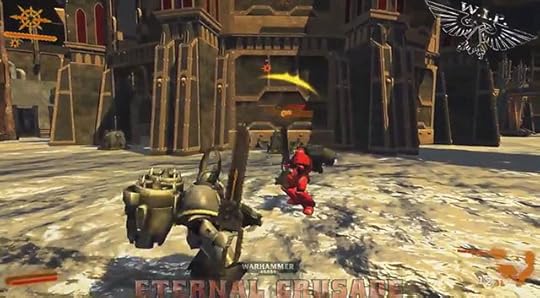
When we met Miguel, Brent, Steven, David and Stephanie and the rest of the visiting Behaviour team, their passion for the project (especially from Miguel) was astoundingly clear. They had a vision for this game that far outstripped anything I’d thought would be the case, and when Ant and I responded in kind with our ideas for what the background could be, I think we all saw there was a natural fit here.
Ant was taken on as the games Narrative Designer, and I was taken on as the writer, with an initial brief to craft the world on which the game would be set, together its history and a number of layers to it that would allow secrets to come to light as the gamers played more. This was an interesting process, as it was, essentially, a story without end. In an MMO game, you’re not looking to tie the story up at the end, because there is no end. So any narratives you create have to be open ended enough to continue on beyond individual campaigns, but contained enough that they provide satisfaction for the players fighting them.
I loved working with Ant on this. He and I have been great friends for many years and worked closely at Games Workshop for years before his return to Australia. He and I have a creative fit that is both complementary and always pushes to raise the bar on the work we’re doing. And in a few weeks of intensive brainstorming and writing, we had the basics of what now forms the world of Arkhona and its attendant secrets.
My initial involvement was in writing a couple of short stories, one a Space Marine story, the other an eldar one. These were intended to whet the appetite and start bringing Arkhona to live and develop some of the characters who’d go on to populate the game and/or drive its narratives. Once this initial work was done, we left Behaviour to go on and develop things until they needed more words on the page.
Unfortunately, in the intervening time, it became impossible for Ant to take on the role of Narrative Designer and into the breach stepped Ivan Mulkeen, who I’ve worked with for the last six months or so. I’ve really enjoyed working with him, and he’s got a great handle on things, with a wealth of experience in video games that have been an immense help in what I’m doing. Which is continuing to craft short stories to add flesh to Arkhona’s bones and act as a sort of 40K universe lore guy.
At time of writing, two of those stories have come to light, but I’ll post more as each one is released.
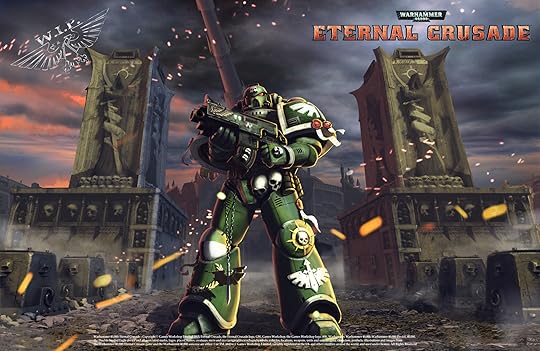
The post Eternal Crusade appeared first on Graham McNeill.
Warhammer 40K: Carnage
Until recently, Linkedin was a thing that always just pottered along in the backgroudn for me. I’d set it up eight years ago when I first took up the life of a freelance pirate, and it had kept going, but hadn’t really done very much. Largely because I hadn’t made the most of it, but it was always there. Then, once I took the time to update it and properly update my profile, a slew of opportunities came in.
There’s a lesson there.
One of those opportunities was to work for Roadhouse Games on a tablet game called Warhammer 40K: Carnage. With a title like that, I was already hooked. I spoke to the guys from Roadhouse to find out a little about the game and what it was they wanted from me. From what they were telling me, it was clear they wanted a lot more than just a simple MacGuffin to kick Space Marines into battle against Orks. No, they wanted a detailed planetary description with warzone, locales, objectives and names. They wanted a detailed planetary history stretching back to pre-Imperial days that lays the seeds for the campaign to come.
That was right up my street, so I set to work in the world-building of the planet itself and its history, working in seeds from its earliest days that would bear fruit in the contemporary setting. I had to introduce a rationale for why only one Space Marine was fighting, together with how the equipment drops worked narratively, together with reasons for how other Chapters might get involved in the fight and how things could get shaken up by a variety of different endings or narrative paths taken by the player. As well as opportunities for extra factions to be added, new opponents to be integrated and a wealth of other options.

I had a blast creating the game world and its history, and by the end of the process, I was all set to use that world as the setting for a story of my own. World-building is incredibly satisfying and the more you do it, the more stories suggest themselves to you (at least they did to me…). By the time we got to the end of the writing, I remember thinking that there was a huge amount of background text, more than would likely be needed for side-scrolling shooter, but having played the game and seen the way Roadhouse are introducing the history and secrets we developed, the more I’m seeing just how vital that kind of texture is to a game, even one that might not apparently require it.
The post Warhammer 40K: Carnage appeared first on Graham McNeill.
Squad Command
This was a project that came out of the blue, if I remember correctly. It’s been a while since I did this, so bear with me.
Squad Command was a turn-based combat game for the PSP by RedLynx/THQ, where the player takes on the role of a squad of Ultramarines in battle against the traitorous forces of the Word Bearers. Each Space Marine has a number of action points to spend in movement, shooting and close combat, and once you and your guys have taken their turn, the enemy gets theirs.
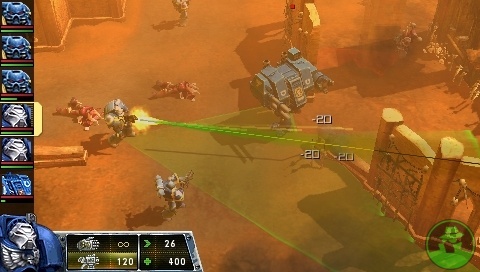
It’s a cracking little game, and I played it quite a bit while sitting in hospital wards waiting for our firstborn son to arrive. The maternity ward rang to the sound of bolter fire and chants of ‘Death to the False Emperor!’, which I’m sure was a change to the usual shouts echoing from its walls.
By the time I came on board, the developers had pretty much gotten to the stage of the game being finished and had placeholder text between the various game levels to narrate the progress of the campaign. Only, as the game neared its completion, someone noticed that the placeholder text was still just that… So I was asked to write the cinematic narration for each of the level intros, taking the player through the various levels and characters and introducing each mission.
As things were time-sensitive to say the least, this was a job that pushed all others to the side. I got a beta of the game to play on the PSP and thoroughly enjoyed it. And to see my words being read in Voice-Over-Man’s voice was pretty special. I still have my PSP and plan to pass it to Evan when he’s a little bit older so that he can play the game I was playing when he was born.
There’s a certain symmetry there that I like very much.
The post Squad Command appeared first on Graham McNeill.
November 13, 2014
Gods of Mars
It almost came as a surprise to be writing this book, as the …of Mars books were, yes, originally devised as a trilogy, but then became a duology. Before, once again, becoming a trilogy. That can partly be ascribed to schedules changing, me coming up with more ideas in the writing than I’d expected and a story that (surprise, surprise) grew in the telling. So, finally, the Kotov Expedition finally...
Vengeful Spirit
Another big novel, and this was one I’d been waiting to get my teeth into for quite some time. For the last bunch of books, we’d seen Horus as a fairly distant character; one who seemed to be letting all his brother primarchs have all the fun. Horus had appeared in cameos in plenty of other books, but never as the hero of his own story, never as the instigator of events. In short, he’d lost his...
November 11, 2014
Do Eagles Still Circle the Mountain?
Written for the Black Library Weekender III, this Uriel Ventris story directly follows on in the minutes after Codex (a story written for the 25 Years of 40k Anthology) and follows the Ultramarines as they attempt to extract rescued captives from the hands of the orks. Set on the worl of Sycorax, it’s a world overrun with orks, but never fear, the Ultramarines are here… Except it doesn’t quite...
Zero Day Exploit
A companion piece to Gods of Mars, this was part cool Mars story, part William Gibson homage. It involves a ‘Spiker’ mission, a hack into the forge of an Archmagos of Mars, in order to steal data, but ends up as far more. The characters who came out of this story all had names that reflected the style of story (as anyone in IT Security can attest) and ended up far more realised and fun than I’d...
Graham McNeill's Blog
- Graham McNeill's profile
- 900 followers


